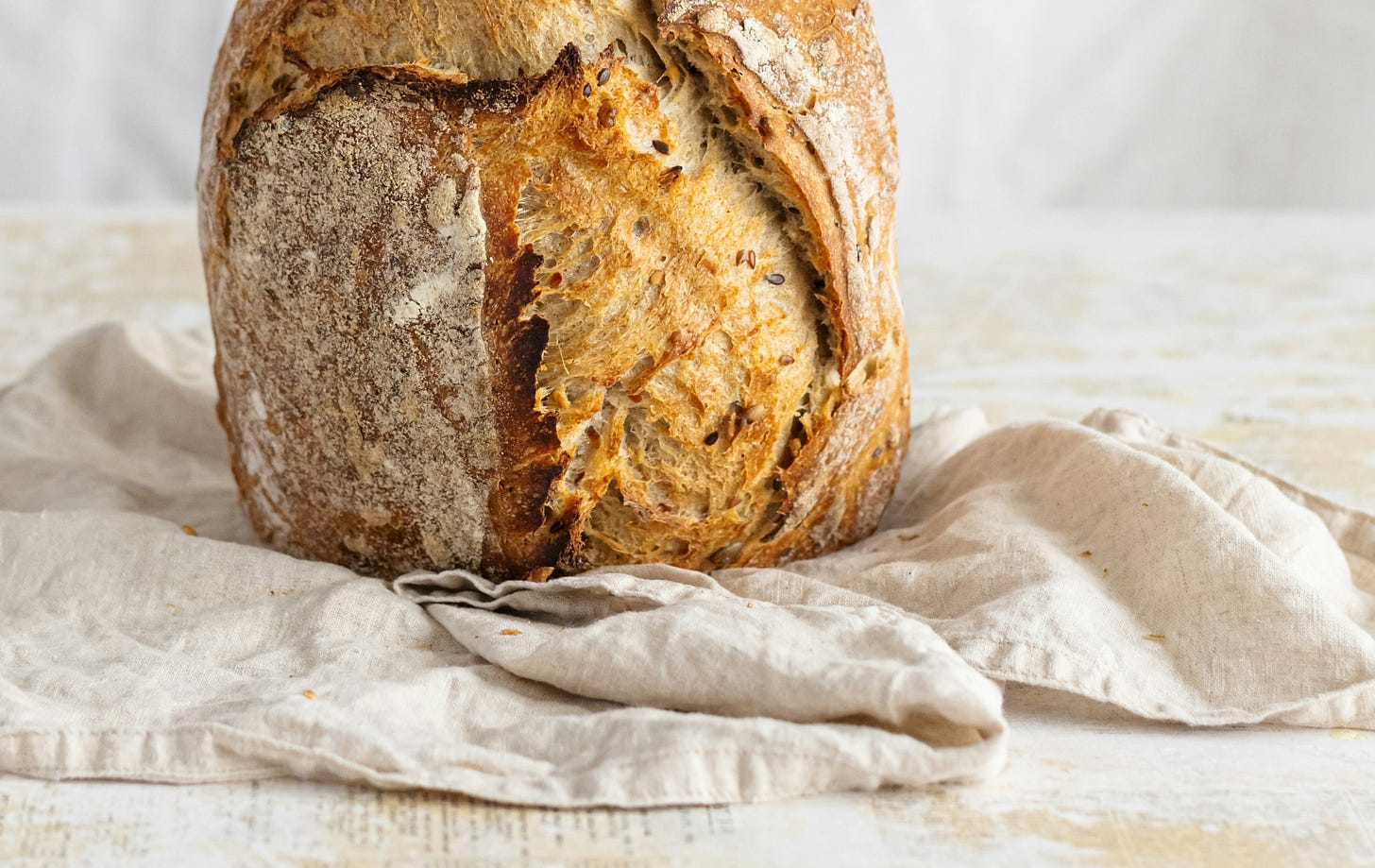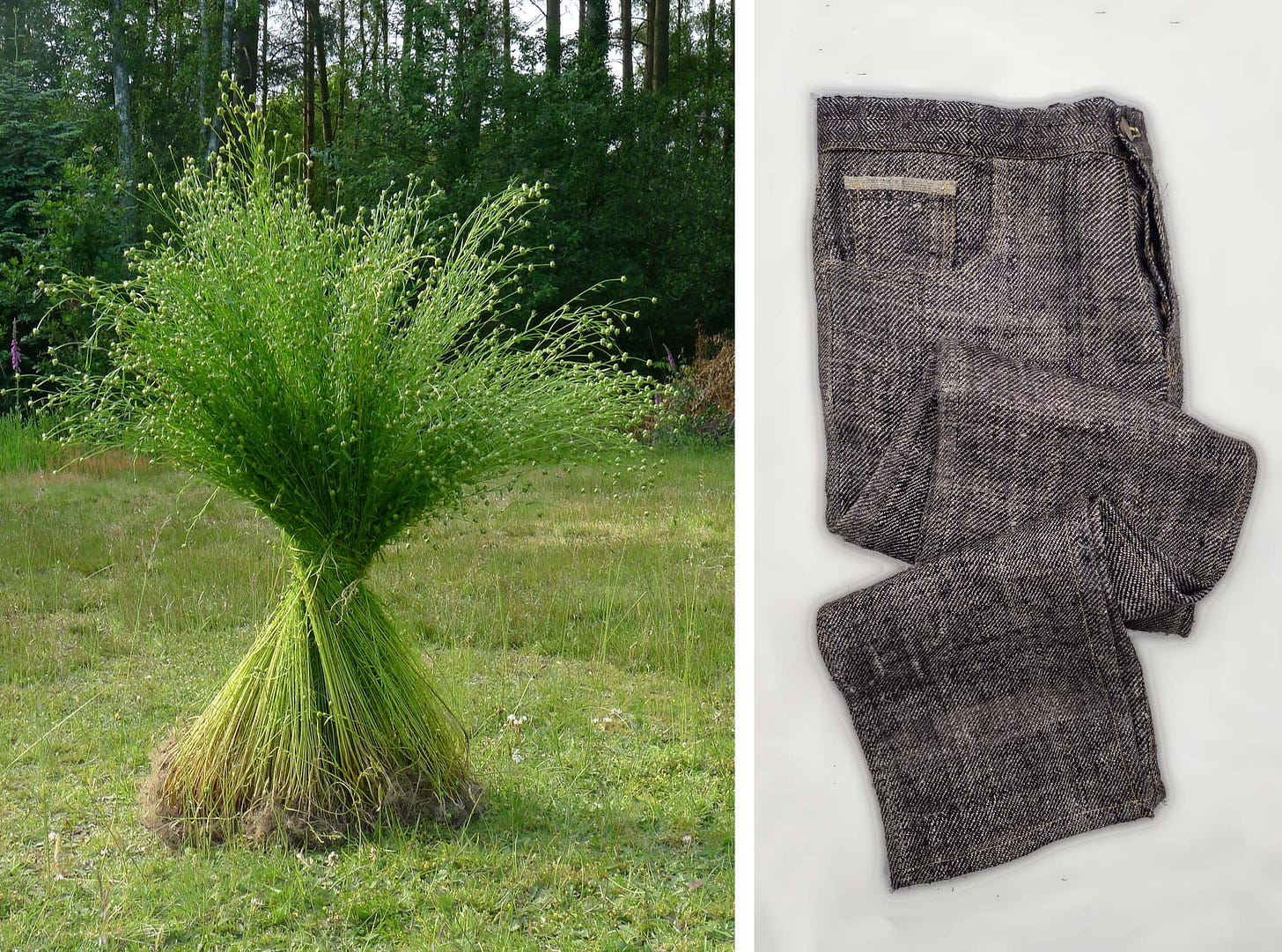Tyson Yunkaporta, indigenous academic and Australian deep-thinker, has described how if we are to address the polycrises and create a long-term liveable planet we need diversity. Diversity of thought, process, peoples, concepts, ecosystems, everything. (Donald Trump is doing everything he can to limit diversity in the US, because perhaps instinctively he understands it has the potential to moderate or even thwart capitalism.)
We humans depend on methods of production to provide the goods we desire for a comfortable and fulfilling life. We must produce these items less harmfully and to enable this, will require diversity in production. A healthy ecosystem is diverse and small-scale manufacturing systems have the potential to contain much more diversity than industrial levels of production. I use bread and linen - basic daily items of food and textiles to illustrate this position.
Climate change is creating unpredictable, wildly variable weather patterns, which makes farming for food and fibre production more challenging. Our agricultural systems need to develop conditions of resilience and diversity can spread risk. Large-scale systems of production require individual concentrations of power and homogeneity. Once you have acquired the capital and purchased an expensive, large metal machine for manufacturing goods, be that food or clothing, you can only feed it what it was designed to consume. If the raw material feeding the machine changes in some way, for example, due to a shift in climactic conditions, it may be difficult or impossible for the machine to accommodate it.
Take the basic human staple of bread, a farmer does not know whether a season will bring intense rain or drought and can balance risk by growing different varieties. Heritage grains, landraces and population wheats grown for flour all bring diversity into an arable system. In the case of population wheats, this happens within the same crop. The soil, fungi, bacteria and insects surrounding fields also like variety, this keeps an ecosystem healthy and alive as it is constantly evolving and adjusting.
Modern wheat is bred for increased yield but with this comes a reliance on inputs sold by the same companies who are selling the seed. These patented varieties are increasingly bringing more risk to the farmer because their conditions are as fixed as weather conditions are variable.
Most farms in the UK grow a single variety of wheat and this suits the calibration of large-scale milling machines. Innovative farmers are adapting to climate change by growing heritage and population varieties to create diversity and resilience. The South West Grain Network contains farmers, bakers and millers working collectively to grow grain that adapts to a range of weather to enable long term food security and improved biodiversity. Open-minded large-scale millers may wish to process these new grains, but their systems and machines find it very difficult to accept difference. Small-scale millers figure out how to mill variable grains on machines they can calibrate and adapt. The bakers within this network also learn to be flexible and bake with a variety of conditions that the flour produces. It is a challenging but rewarding endeavour that requires dedication, patience and knowledge exchange.
Over the past year I’ve visited a range of textile mills becoming aware of how machinery dictates the outcome of the yarn and the possibilities of design. This sounds obvious but as a designer, it’s not until you understand the machine, that you can understand your latitude as a maker.
Take wool for example, assumptions are often made that a wool mill can transform any kind of fleece off the back of a sheep into any kind of yarn, but this is untrue. An experienced hand spinner has a direct relationship with a raw material, be that wool or flax and can respond to the fibre’s strengths to achieve results so much stronger or finer than a mill could. Manufactured yarn is multi-step process requiring many kinds of machinery to enable specified outcomes controlled by settings in response to the raw material input. Machines cannot react in the way that hands and eyes can.
Currently we can’t process flax into yarn in the UK and if we are to invest in new machinery and set up a supply chain it would cost millions of pounds. Flax is flowering plant from the family linaceae, grown to produce linen. Agriculturally it is similar to wheat and open to the vagaries of weather. When the yields of a crop are variable, investment in expensive machinery is a difficult case to make, irrespective of any political and ethical persuasions.
As the biggest growers and processors of flax in the world, the French, are starting to change their growing practices as crop outcomes are no longer dependable. If we are to develop new textile systems that work in partnership with nature, it makes sense to respond to the variability of our climate. Working at a small-scale reduces risk and allows for adaptability.
Small scale flour mills like those owned and run by Fresh Flour in Devon and The Field bakery in Somerset are inexpensive to set up and allow experimentation and adjustment. These businesses work with different grains to produce pasta and bread from locally grown, unusual flours that taste different and delicious. Eating and experiencing this food is an enjoyable and memorable experience.
In ‘Tools for Conviviality” Ivan Illich describes a need for society to enable conviviality, relationships, and energy use at a human-scale. In ‘Small is Beautiful’, also published in 1973, EF Schumacher asks for cheap, small-scale methods compatible with the human need for creativity, with the cost of any machine in balance with the wage it is possible to earn from it. Production should be owned by workers developing relationships and products at a human-scale. Work should not only be understood through the lens of capital and rationality but through providing a life worth living.
Schumacher also states that small-scale operations, no matter how numerous, will always be less harmful to the environment than large scale ones. These are fairly simple concepts, generally ignored due to profit prioritisation, but difficult to dispute in relation to human and planetary thriving.
Fantasy Fibre Mill develop small-scale, inexpensive, textile processing machinery to enable to the production of linen textiles in the UK. Nick Evans, a Director/Inventor recently supported Brigitte Kaltenbacher, a community flax organiser and weaver, by spinning yarn from communally grown flax so that Brigette could weave a linen jean. The cloth produced by Nick and Brigitte has a character not found in a standard jean, they worked together, iteratively adjusting the yarn to be woven into an item of clothing that contains the input, love and learnings from many people.
Crafting textiles by hand is an enjoyable but VERY, slow process requiring multiple artisanal skills. The help of machines is required to make any decent amount of cloth. The flax to linen machinery, developed by Fantasy Fibre Mill, consists of a breaker, scutcher, hackler and spinning machine. It can be put together using easily available, inexpensive parts. This human-scale supply line will be operated by 1 person with some energetic support. Although the system is not quite ready to produce enough yarn for more than a small sample at present it is evolving and improving every day through the personal dedication of Nick and a collaborative support network of fellow enthusiasts.
In textiles, we are looking for a sweet spot that reduces the time, and cost involved in making by hand and retains a creative, adaptable, less harmful process. As Illich states, ‘convivial tools are those which give each person who uses them the greatest opportunity to enrich the environment with the fruits of his or her vision'.
Illich’s musings have inspired many modern communicators and scholars of the commons. I recently had the pleasure to speak at ‘Conviviality, culture and the commons’, the inaugural Schumacher College ‘Wild’ event since their divorce from the Dartington Estate. I shared how commoning informs my work and how it shapes collectively caring for social networks, knowledge, cultural practices and resources which are shared for the benefit of everyone.
In its simplest form, commoning is an activation of community, it begins with field building; learning and developing relationships with people. This is how South West Grain Network’s work with grain and bread started, it’s how the Bast Fibre Network - a group I convene around the subject of flax and hemp - began. People meet, talk about a problem, and as they develop convivial relationships, trust develops, and things happen together.
Like the South West Grain Network is developing bread in different ways, the South West England Textile Commons seeks to develop textiles through embracing difference, incorporating diversity and developing the flexible systems and process to allow for this. Stewarded by myself (Liflad), South West England Fibreshed, Wessex Community Assets and Fantasy Fibre Mill and involving with many other collaborators such as Flaxland, Transition Town Totnes and The Flax Project Plymouth, our project is figuring out a more convivial process to grow flax, produce linen and other related materials within our local context.
The methods we develop will be mindful and able to respond to what is grown in a particular year. The tools used will be inexpensive to construct and enjoyable to use, operating using minimal energy. Perhaps the textile producer will grow the raw materials and dyes, process them when the sun shines, stitch and weave in the winter and sell the outputs within a cyclical, seasonal, community supported system.
In traditional business, an entrepreneur is encouraged to network and develop relationships with the aim of raising investment. With the South West Textile Commons we use the frame of commoning to raise and share funding as a collective, undertaking a similar process underpinned by completely different values.
We hope that a cooperative ecosystem, feeding multiple enterprises will ultimately emerge involving distributed decision making, distributed resources and distributed benefits. Learning together, experimenting, researching, testing, sharing innovations and adventures across South West England working towards our aim of supporting land-based bioregional livelihoods centred around textiles and related natural materials. We don’t know the details yet but are collectively working this out, at the speed of trust, taking small but steady steps.
Diversity in production will not ‘make us money’ because it will always take more time, however, if we work together, it may become possible to earn a living. In these turbulent times, we need to steadfastly embrace diversity. Small scale, bioregional, clothing commons can facilitate this through flexibility of process and outcome - through the seeds that are planted, crops that are grown and products created convivially and creatively in community.
Resources:
https://www.swtextilecommons.uk/
https://www.southwestgrainnetwork.co.uk/
https://www.bastfibrecommons.org/2025/04/02/community-led-textile-resilience-in-southeast-england/



